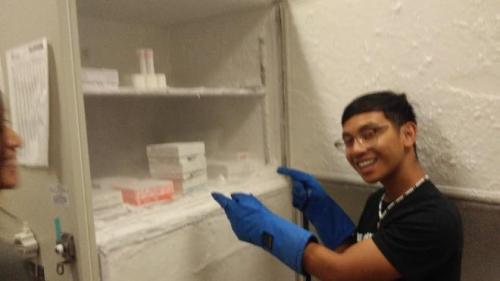
How to survive a year in PREP
When I first came into the Trimmer lab at the start of my PREP experience, I felt like I did not know anything. It was an overwhelming experience to be sure. Now, as I am leaving, I have learned how to execute new assays, navigate the lab space and design experiments. All of this has helped prepare me for the similar process at the start of graduate school. In this blog I want to offer the pieces of advice I would give myself if I were starting this year over again.
If you don’t know, ask!

Fridges and freezers are always going to be a mystery, there will always be new protocols, and if you feel lost, don’t be afraid to speak up. No one can expect you to know these things at the beginning; do not let them hold you back. The same is true for assays and background in your new field. If you have never worked with an assay before, there will be a lot of things that are new to you that others might think of as obvious or implied. Questions like, “What kinds of controls do you use? What kinds of information can this give? and What kinds of questions can this answer?” are all good things to ask when working with a new system. All of these things are questions you should feel comfortable asking, they are not a sign of weakness or an imposition. As I built closer relationships with my cohort and coworkers, asking for help and knowing when to ask for help got easier.
Literature!
I cannot overemphasize the importance of reading up on relevant literature. I think the most difficult parts of this are the steep learning curve, and the challenge of knowing where to start. As far as knowing where to start goes, I got my best advice from talking to my mentor and the more senior members of the lab. These people have a much deeper understanding of the field and were able to offer resources to answer questions I did not even know I had. Additionally, it is possible to pick up on important literature in lab meetings or talks. It took me too long to realize that could really deepen my understanding of a topic by reading some of the papers cited in a talk or a confusing paper.
Set clear goals!
With so much information to keep in mind it is easy to feel as though you are drowning in questions and facts. In order to stay productive, it is important to managing your time and expectations. One of the greatest challenges for me was keeping both the higher level and the details in mind. For each project, I found it helpful to write down the Big Idea (if you are not too sure what that is, start with something, you can refine it over time). To keep the details straight each day I like to make a small list of 3-5 achievable goals. Plan them in advance, follow up on how you did after. If something was too challenging, next time, make the instructions more detailed, if something took too long, account for it next time. If something was easy, you might have time to add 1 more to your list next time. Keeping track of your goals and accomplishments is important in this kind of environment. Without so much structure to keep yourself accountable, you need to create your own structure so you don’t overdo it.
My final piece of advice: Don’t freak out.

Starting in a new environment will always be challenging. It is completely normal to feel lost, slow, or incompetent. In reality, you probably are, but everyone is at the start. We all grow and learn from our mistakes on the way to becoming better scientists. In PREP@UCD, a support system of fantastic people intentionally and unintentionally contributed to my experience this year. Learn from those around you, you will become a better scientist, and make some good friends along the way!